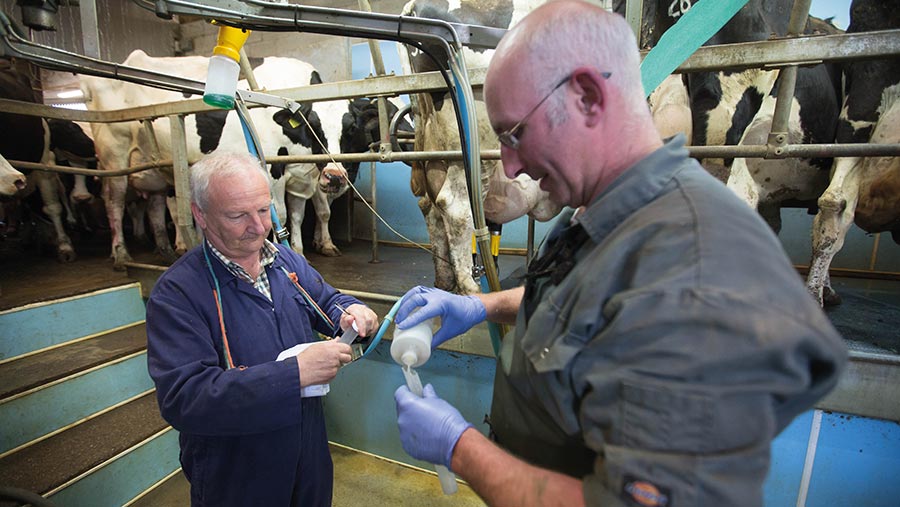Why staff leave farming businesses and how to keep them
 © Tim Scrivener
© Tim Scrivener With many farm businesses unable to find or keep suitable workers, it is more important than ever to consider your staff’s working environment.
Employment consultant Paul Harris examines the reasons for poor staff retention and gives advice on how to hold on to valuable people in your business.
See also: How farmers can bust 4 common myths about working in ag
Many suggest that there is a skills shortage as the lack of new entrants into the industry doesn’t replace the skills and experience of those retiring or simply exiting the industry.
However, there is one factor that is fully within farmers’ control, and it continues to be the single biggest reason that staff leave a farming business or the industry entirely: “The way the boss spoke/behaved/communicated with me.”
In our discussions with staff seeking new employment, this is the most consistent reason given. Other factors commonly listed are career progression, long working hours, poor working conditions, and unsatisfactory housing.
About the author
Paul Harris is managing director of Real Success – a people consultancy that helps the agricultural sector to improve staff management. A regular speaker at industry events, Paul is widely recognised as a thought leader and positive advocate of staff development in the agricultural sector.
But without exception, the final push cited as their reason for seeking new employment is the management style of the farm leadership.
If this is such a common reason for staff turnover, what can you do to prevent this on your farm? The answer is simple – understand your communication style.
See also: How to reduce staff working hours on dairy farms
Personality impacts behaviour
You and every member of your team (including family members) have a unique “personality style” and this directly affects how you talk, behave, and prefer to work.
The term “it was a personality clash” is something we hear frequently at the screening process ahead of interviews when we ask why someone is leaving their role. But what does this mean?
There are numerous systems available to help you determine the personality style of your team, with most based around the work of Carl Jung. His theory gives colours or names to describe different personality traits.
A short test or questionnaire is carried out to establish the individual mix of the traits that suggest how a person is likely to respond in certain situations, and how they will prefer to be spoken to or approached by others.
This information can be key to unlocking the potential within your team. It will also explain why certain people can work well together while others may clash.
Team profiling
Outside of agriculture, it is standard practice to profile a team and any potential new recruits to establish how they may fit in to the existing group.
While this process is gaining momentum in farming, it’s still a long way behind other industries in using science and psychology to help build the right team.
It’s also vital to understand why our own personality style may be the reason that someone in the team has decided to leave.
The Vita Profiling system, developed by Real Success purely for the farming industry, is one such system and uses four main personality styles:
- Visionaries are assertive, decisive, forward-thinking and driven by facts and results. To others, they may appear to be a little blunt at times. When talking to a visionary, be direct, quick and get to the point with eye contact and confidence.
- Investigators are organised, like to plan, are logical with high attention to detail. To others they may appear to be overly critical at times – often pointing out what is wrong rather than what is right. When talking to an investigator, speak more slowly and precisely as they prefer logic, reasoning, and need time to reflect before responding.
- Team makers are supportive, considerate of others and often good listeners. To others, they may come across as a little hesitant, preferring to avoid conflict with others. When talking to a team maker, speak warmly, calmly and offer reassurance.
- Adventurers are imaginative, optimistic, sociable and energetic. To others, they can appear to be easily distracted and struggle to focus. When speaking to an adventurer, do so with energy and enthusiasm. They like work to be fun and will often be full of new ideas.
It’s important to recognise that everyone is a unique blend of the four styles, and all of us have elements of each style within our personality.
However, we often lead more strongly with one or two of the styles and it is this dominance of specific styles that creates our differences.
Communicate effectively
Your role as leader or manager is to identify your own preferred style and to then flex your style towards those you are leading or managing.
You should not simply expect others to be like you as this is demotivating for staff. You must be aware of potential clashes within the team and help people to recognise their differences.
As each member of the team begins to understand their own preferences, they can each flex their style when working with others who may be different to them.
Learning to communicate effectively isn’t fluffy, psycho-babble. It is the hard reality of the primary cause of staff turnover across all sectors of farming. Our personality differences can be what makes or breaks a team.
